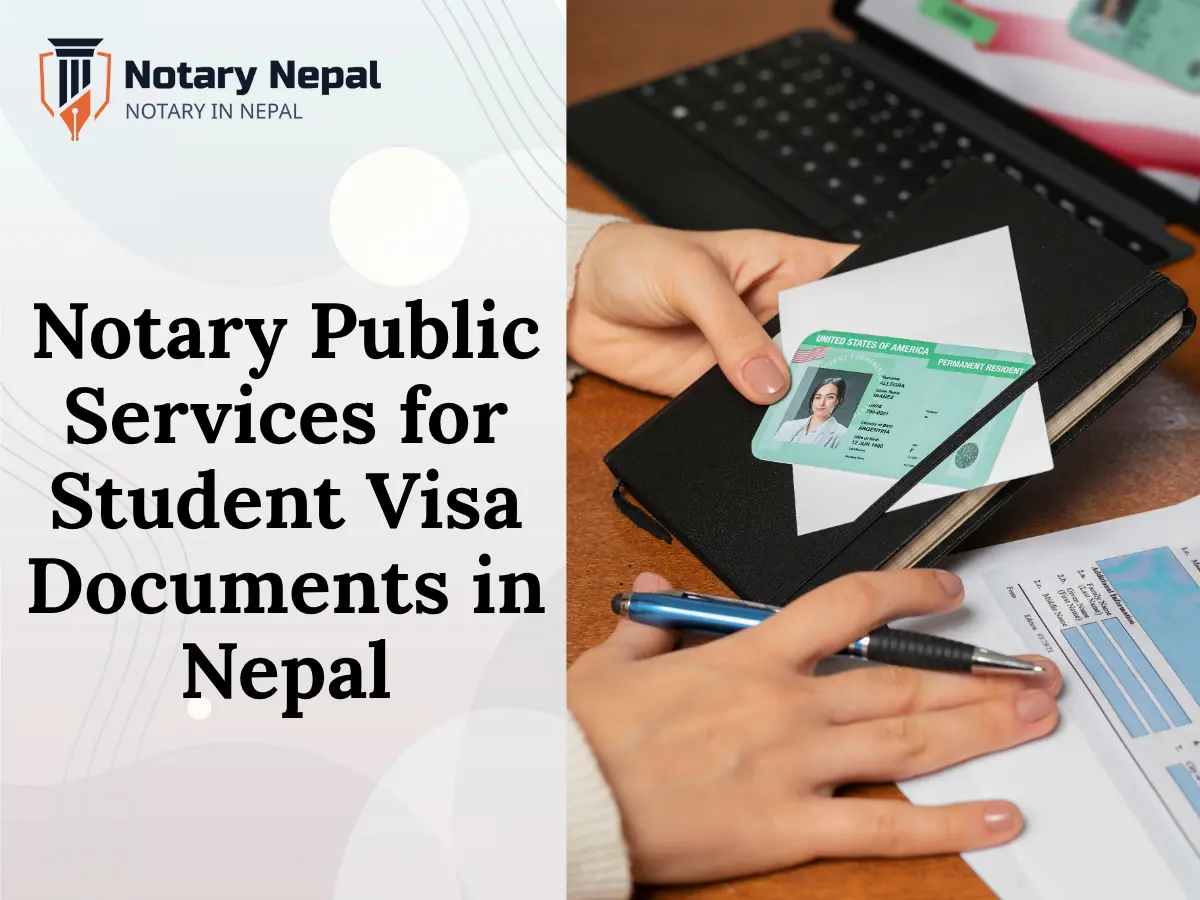

Table of Contents
Applying for a student visa to study abroad is a major milestone—and ensuring your documents are correctly notarized is a crucial step in this process. For students in Nepal, understanding how to get your student visa documents notarized properly can be the difference between a smooth approval and frustrating delays. This guide covers everything you need to know about notary public services for student visas in Nepal, including legal requirements, common documents, processing tips, and how to find reliable notaries.
Why Notarization Is Crucial for Student Visa Applications in Nepal
Notarization verifies the authenticity of your documents, confirming that the copies or affidavits are genuine and legally binding. Embassies and foreign institutions typically require notarized documents for student visa applications to prevent fraud and ensure the validity of your paperwork.
In Nepal, notaries public play a vital role by officially certifying documents such as affidavits, transcripts, letters of consent, and power of attorney related to student visa applications. Without proper notarization, your visa application may be rejected or delayed, impacting your study plans.
Common Student Visa Documents That Require Notarization
Most student visa applications involve several key documents that must be notarized, including:
- Academic transcripts and certificates: Degree certificates, mark sheets, diplomas
- Affidavits: Statements of financial support, guardianship affidavits, declaration of no objection
- Consent letters: From parents or guardians if underage
- Passport copies: Certified copies for verification
- Power of Attorney: Authorizing representatives to act on your behalf
- Admission letters and acceptance letters: Official documents from the educational institution
- Visa application forms: When required to be notarized by embassies
Ensuring these documents are notarized correctly is essential to meet embassy and immigration standards.
Understanding the Notarization Process for Student Visas in Nepal
Step 1: Document Preparation
Collect all necessary original documents and their copies. Ensure all copies are clear and complete.
Step 2: Choose a Licensed Notary Public
Select a registered notary public in Nepal with experience in student visa documentation. Many offices in Kathmandu and major cities provide these services.
Step 3: Submit Documents
You may submit documents physically or digitally via email or messaging apps like WhatsApp. Nepal currently follows a hybrid notarization process—documents are printed, notarized manually, and then returned as digital copies or hard copies per client preference.
Step 4: Notarization & Verification
The notary public reviews, certifies, and notarizes the documents, attaching official stamps and signatures.
Step 5: Receive Your Documents
Notarized documents can be picked up in person, couriered to your address, or sent via email in digital format.
Legal Requirements & Compliance for Student Visa Notarization
- Notarization must be conducted by a government-authorized notary public recognized by Nepali authorities.
- Documents must comply with embassy-specific notarization standards.
- Affidavits and declarations must be truthful and complete; false statements may have legal consequences.
- Apostille certification may be required for some countries, and can be arranged after notarization.
Finding Reliable Notary Services for Student Visas in Nepal
- Look for notaries with verified licenses and positive client reviews.
- Confirm that they provide hybrid notarization (digital submission + manual notarization).
- Ask about turnaround time, document handling protocols, and confidentiality measures.
- Prefer notaries with experience in visa document notarization specifically.
Tips to Ensure Smooth Notarization for Student Visa Documents
- Start early to avoid last-minute rush and delays.
- Double-check all documents for completeness and accuracy before submission.
- Maintain good communication with your notary public throughout the process.
- Keep copies of all notarized documents and receipts for your records.
- Clarify any embassy-specific notarization requirements upfront.
Frequently Asked Questions About Notary Public for Student Visa Nepal
Q: Can I notarize documents online in Nepal?
A: Nepal uses a hybrid notarization process where documents are sent digitally but notarization is done physically by a registered notary.
Q: How long does notarization take?
A: Typically 24-72 hours depending on document complexity and notary workload.
Q: Are notarized copies accepted by foreign embassies?
A: Yes, if done by a licensed notary public and if they meet embassy requirements.
Q: Can minors get documents notarized?
A: Yes, but additional consent letters or affidavits notarized by guardians may be needed.
Conclusion: Your Trusted Partner for Student Visa Notarization in Nepal
Getting your student visa documents notarized is a critical step towards studying abroad. Nepal’s hybrid notarization system ensures legal compliance while adapting to modern convenience. By choosing experienced and licensed notaries and preparing your documents carefully, you can smooth the path to your educational goals overseas.
For trusted, efficient, and embassy-compliant notary public services for student visa documents in Nepal, contact Notary Nepal. We’re committed to helping you break language and legal barriers, making your international academic journey seamless.
Contact Notary Nepal Today
Phone: +977 9765979296
Email: info@notarynepal.com
Website: https://notarynepal.com
This article is for informational purposes only and does not constitute legal advice, advertisement, or solicitation. Notary Nepal and its team are not liable for any consequences arising from reliance on this information. For legal advice, please contact us directly.


